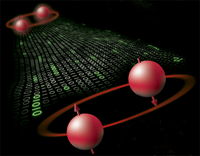
He will defend his thesis ‘Quantum Entanglement in Non-local Games, Graph Parameters and Zero-error Information Theory’ on Wednesday 27 November 2013 at the University of Amsterdam.
Quantum entanglement is a quantum mechanical effect where two particles are entangled in a way that they affect each other’s properties, even when they are far apart. This counter-intuitive effect implies that between two distant particles there can exist a kind of correlation that strongly contradicts the principles of classical physics. Nonetheless, the effect has been experimentally demonstrated with various particles, forcing physicists to accept the existence of non-local effects in nature.
Scarpa has studied several applications of quantum entanglement for information processing and communication. He found several new settings in which two persons who are separated and forbidden to communicate can theoretically exploit quantum entanglement to coordinate their actions. Also, he showed that the number of error-free messages that can be sent through a noisy channel can be improved by quantum coupling the messages.
Giannicola Scarpa is a PhD student at Centrum Wiskunde & Informatica under the supervision of prof. dr. Ronald de Wolf in the Algorithms & Complexity group. His work is funded by the NWO Vidi Grant of Ronald de Wolf.
Thesis: ‘Quantum Entanglement in Non-local Games, Graph Parameters and Zero-error Information Theory’
By: Giannicola Scarpa (CWI Algorithms & Complexity group)
Promoter: prof. dr. R. de Wolf (CWI and UvA)
Date: 27 November 2013, 10.00h
Place: Agnietenkapel, Oudezijds Voorburgwal 231, Amsterdam
Image: Cover of Nature Physics, October 2006
